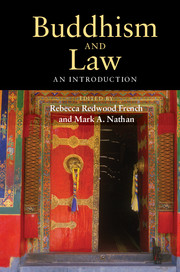Book contents
- Frontmatter
- Dedication
- Contents
- Maps and Illustrations
- Contributors
- Preface
- Abbreviations
- Introducing Buddhism and Law
- Part I The Roots of Buddhism and Law in India
- Part II Buddhism and Law in South and Southeast Asia
- 6 Buddhism and Law in Sri Lanka
- 7 Flanked by Images of Our Buddha
- 8 The Legal Regulation of Buddhism in Contemporary Sri Lanka
- 9 Pāli Buddhist Law in Southeast Asia
- 10 Genres and Jurisdictions
- Part III Buddhism and Law in East Asia
- Part IV Buddhism and Law in North Asia and the Himalayan Region
- A Selection of Readings
- Index
- References
8 - The Legal Regulation of Buddhism in Contemporary Sri Lanka
Published online by Cambridge University Press: 05 August 2014
- Frontmatter
- Dedication
- Contents
- Maps and Illustrations
- Contributors
- Preface
- Abbreviations
- Introducing Buddhism and Law
- Part I The Roots of Buddhism and Law in India
- Part II Buddhism and Law in South and Southeast Asia
- 6 Buddhism and Law in Sri Lanka
- 7 Flanked by Images of Our Buddha
- 8 The Legal Regulation of Buddhism in Contemporary Sri Lanka
- 9 Pāli Buddhist Law in Southeast Asia
- 10 Genres and Jurisdictions
- Part III Buddhism and Law in East Asia
- Part IV Buddhism and Law in North Asia and the Himalayan Region
- A Selection of Readings
- Index
- References
Summary
Introduction
Regularly, in courtrooms around Sri Lanka, judges and Buddhist monks find themselves, quite literally, in a standoff. Sri Lanka’s code of civil procedure stipulates that all persons must rise when a judge enters the courtroom. However, Buddhist custom dictates that monks, on account of their spiritual superiority, must never rise to greet non-monks, judges included. So, when a judge enters a courtroom with monks present, there is a dilemma: Who stands in deference to whom? Religious and civil authorities collide, before a word is even spoken.
The dilemma of competing political and religious authority has a long history in Buddhism. Pāli Buddhist texts tend to conceive of the relationship in two opposing ways. In certain places, Pāli sources insinuate the dominance of political authority by describing the rights of kings to periodically “cleanse” (sodheti) local monastic fraternities of impious or heterodox monks. In other places, Pāli texts suggest the superiority of religious authority by describing monks as assessing the virtues, beneficence, and legitimacy of kings. Taken as a whole, Pāli Buddhist texts portray the links between state and religious authorities as a kind of reciprocity or tension (depending on how one reads it) in which rulers guarantee the piety of monks and monks guarantee the righteousness of rulers – each side claiming to protect, in a broad sense, the vitality of Buddhism in the world.
- Type
- Chapter
- Information
- Buddhism and LawAn Introduction, pp. 150 - 166Publisher: Cambridge University PressPrint publication year: 2014
References
- 6
- Cited by



